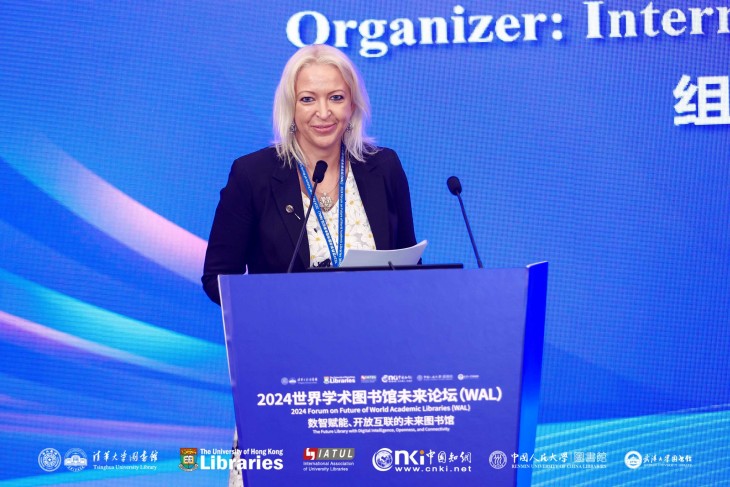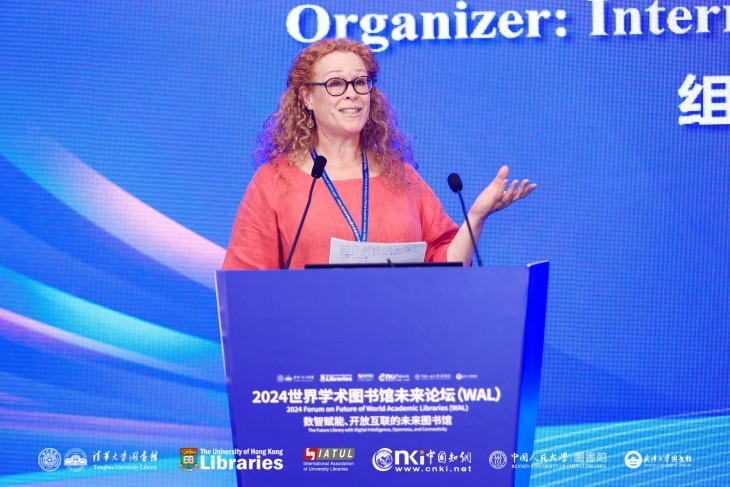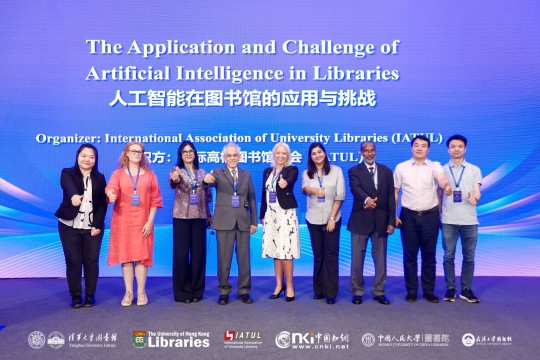The application and challenge of artificial intelligence in libraries
The 2024 Forum on the Future of World Academic Libraries (WAL): the future library with digital intelligence, openness and connectivity was held in Beijing, China, from 24th -27th June.
The Forum was convened to respond to the ongoing evolution of the academic library and its services, jointly organised by Tsinghua University Library, the University of Hong Kong Libraries, IATUL and CNKI.

IATUL’s President, Dr. Anna Wałek
IATUL was well represented and hosted the parallel session on the morning of 24th, which proved an excellent opportunity to share knowledge and practice and to discuss emerging trends in AI in academic libraries.
Chaired by IATUL’s President, Anna Wałek, seven experts spoke of their experience with AI and their thoughts for the future.
Following these presentations Kate Robinson, IATUL Secretary, provided a summary to spark discussion and questions from the audience.

IATUL’s Secretary, Kate Robinson
Shameen Nilofar Maideen,
University Librarian at Singapore Management Library, shared how SML is tackling the challenge of AI by telling the story of how she ‘engages, educates and empowers’ the researchers and students of SML so they can adapt and thrive – experimenting with different approaches and tools to use AI for the benefit of their users by placing them at the heart of her services.
Ali Amour Suleiman El-Maamiry,
Manager and Library and Learning Resources, University of Dubai, shared a history of AI in a library context. He looked back to the tools we had become comfortable with and looking forward to the new, more disruptive areas of AI and our response to this in a world where user expectations and strategies have changed and where we too need to change to meet their needs – encouraging us to become ‘patron-centred’ rather than ‘patron-centric’.
Wang Bing,
Chinese Studies Librarian and Assistant Professor, University of Illinois Urbana-Champaign (USA), spoke about the transformative impact of AI in the context of a focussed project to examine how AI tools are reshaping academic research. She considered how librarians can best support this new approach to academic enquiry by using AI tools while retaining ethical and scholarly standards and enhancing academic discourse – raising awareness of the significant changes and challenges to both academia and librarianship.
Bakheet Beshtawy,
Specialist Librarian, Department of Medical Education & Research, Dubai Health Authority, shared his experience of transforming virtual journal clubs using AI into efficient, accessible and dynamic learning environments that foster global collaboration amongst researchers – leading us through five steps to achieve this and providing insights into what may come next.
Hu Lin,
Research Librarian and Director of Knowledge Service Centre, Sichuan University Library (China), highlighted the inequity we are experiencing with AI tools, where many of us are unprepared for such a rapid change. He introduced us to some amazing AI tools and reminded us of our responsibility to be at the forefront of this change, strengthening AI literacy to cultivate a new generation of students and researchers so they can rationally and objectively understand, use and master AI – with the plea of “and do not let our readers be left behind”.
Dilara Begum,
Chairperson and Associate Professor, Department of Information Studies, East West University (Bangladesh), spoke about the use and applications of AI – how AI is shaping our lives and its context in our profession. She suggested how we might respond strategically and what initiatives we might engage with, highlighting IFLA’s approach. She warned us that without using AI tools it will be hard for us to survive and said we must take the initiative and engage with AI now, enhancing our practice and sharing our knowledge with our users. We need to be ‘dynamic professionals’ to inspire others and we can best do this through collaboration, through developing policies, guidelines and best practice so we can be ‘change-makers’.
Zhou Yong,
General Manager, AI Product Division CNKI (China), brought the session to a close with his refection on how AI supports library service innovation through CNKI’s practice and his explanation of how best to approach implementation. He demonstrated the system’s applications and AI capabilities and its problem-solving capacity, speaking about its implications for libraries and its future possibilities.
